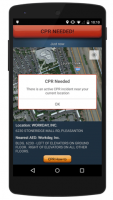By Fanny Gillet and edited by Colleen Young
By Fanny Gillet and edited by Colleen Young
 On Wednesday 22nd, hcsmca-ers put themselves in a large academic health center CIO’s shoes to imagine what health care application they would recommend for patients use. Co–moderators, Mark Casselman (@markcasselman) and Will Falk (@willfalk), started the discussion by sharing 5 background facts:
On Wednesday 22nd, hcsmca-ers put themselves in a large academic health center CIO’s shoes to imagine what health care application they would recommend for patients use. Co–moderators, Mark Casselman (@markcasselman) and Will Falk (@willfalk), started the discussion by sharing 5 background facts:
- Hospitals, doctors, nurses, researchers, patient groups, and developers are rapidly developing apps. 1000’s of apps available.
- How to direct patients to apps? Need to construct Apps delivery system. HC organizations develop & publish an “App Formulary”.
- #appsformulary provides physicians with list of applications that have been tested and approved for use by their patients.
- …and for consumers to easily identify and access health and fitness apps that are credible and well-designed.
- We need process & standards for selection, & taxonomy for regulation of apps. Some OTC, some prescription, some “front of store”
And so the question was posed:
T1: Imagine you are #CIO* of large academic health center – what apps would you put in apps pharmacy for patients? #hcsmca #appsformulary *CIO = Chief Information Officer
The first applications mentioned were those related to quitting smoking. Should these applications be used without healthcare professional supervision and collaboration?
@kgrindrod But as with smoking cessation products, I don’t think app should be used without concurrent provider care #hcsmca
— Pat Rich (@cmaer) 22 mai 2013
Should access to medical applications available in the Application Formulary be controlled and monitored? For example, following the example of over-the-counter drugs vs. prescription drugs, some applications could only be downloaded by “prescription” or with a patient ID number.
@kgrindrod great point. that’s where apps pharmacy comes into play – outpatient clinic registry IDs patients who can access OTC apps #hcsmca
— Mark Casselman (@markcasselman) 22 mai 2013
Then chat participants raised the question of approval and regulation – By whom and how?
Some chat members suggested patients as well as healthcare providers should be part of the approval team, adding that users (both patients and professionals) could and should participate in co-designing applications.
@mubnii @shabeenfh And approval is an issue. Who would approve. Colleges? Med Assn’s? Some risk/cost for any who take it on#hcsmca
— Pat Rich (@cmaer) 22 mai 2013
Medical colleges and associations consult each other but each have clear responsibilities. Associations rarely set regulations, Pat Rich (@cmaer) went on to say.
Chat members raisedconcerns about clinicians endorsing applications. Some were afraid that there would be a lack of transparency. That’s why @markcasselman suggested the creation of a specific committee that included people with a variety of backgrounds.
@kgrindrod not only physicians, but patients, family caregivers, community sector, hospital staff, etc as selection committee #hcsmca
— Mark Casselman (@markcasselman) 22 mai 2013
We saw that, to be useful as a communication tool, healthcare providers should examine and analyze data gathered by patients via prescribed or recommended applications. However, some hcsmca-ers maintained that not all data needed to be shared and that self-monitoring tools can be equally useful. Chat members talked about portals where patients and doctors could share data, providing they are secure.
#hcsmca T1: @colleen_young if the data helps you #self improve your health, then it matters less whether your doctor uses it.
— Laith Bustani (@laithbustani) 22 mai 2013
Some chat members said that the wayfinding applications have proven to be very useful for visitors to hospitals, especially if they were regularly updated and included anomalies such as temporary clinic relocations and renovations, etc.
@markcasselman As a patient, I would expect a wayfinding app to be in an #appformulary Formulary = clinical use for me. #hcsmca
— Colleen Young (@colleen_young) 22 mai 2013
Hcsmca-ers talked about applications that could be used for dementia to help caregivers or patients at early stages, for example reminders or GPS trackers.
@alztoronto In my research I’ve encountered older adults with head injuries who rely heavily on it but not alz patients. #hcsmca
— Kelly Grindrod (@kgrindrod) 22 mai 2013
Finally, chat participants underlined the importance of helping patients to find and filter applications. That can be the role of the local libraries, community centers and local applications developers.
@kgrindrod @farrahschwartz #hcsmca and local Apps developers if the Apps are not offensive. Front of store and OTC can have low threshholds
— Will Falk (@willfalk) 22 mai 2013
During the discussion hcsmca-ers shared the following:
Applications
- Alberta Health Services wayfinder
- BC Health Service Locator Application
- Crush the Crave – quite smoking
- BANT – diabetes management
- FitBit
- Hamilton Health Sciences wayfinder
- Mobi Care – Alzheimer’s disease and related dementia
- MyMedRec
- The My Heart&Stroke Health App
- Track CHF patients
Articles about apps
- 20 mobile applications for nurses in 2012
- Knowledge is the best medicine (KiBM) – a program that helps you take control of your health and work with your prescriber and the rest of your healthcare team to manage your medicines safely and appropriately.
- Mobile Devices for Medical Education
- Mobile Health Around The World
- New free phone application could help you keep track of your medications
- Post-surgical app shows bright future for outpatient support and recovery at home
- Stroke app aids patient engagement in treatment choices
- imedical apps – the leading physician publication on mobile medicine
Here’s the full transcript of the chat.
What apps would you give a thumbs up? Which ones get a thumbs down?








